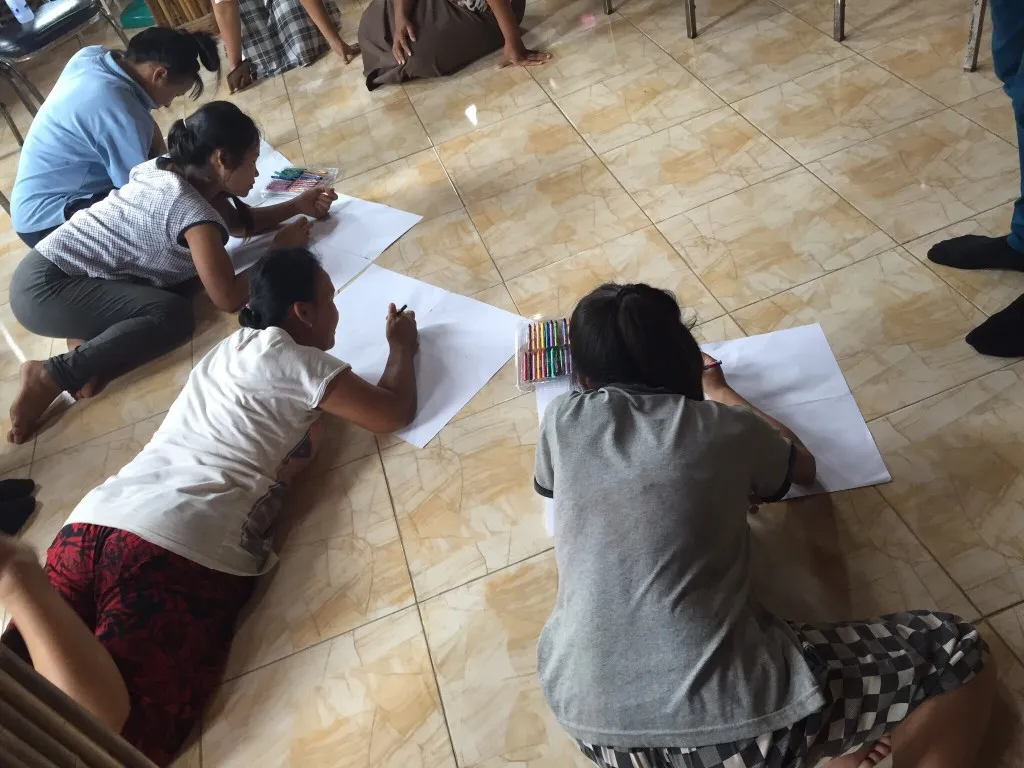

Every Wednesday an outside organisation called Babsea facilitate law class. Babsea bridges across water South East Asia provides access to justice and legal education which focuses on ethically orientated legal capacity development and community empowerment. Their goal in the Wildflower Home is to provide interactive and relevant law/rights lesson plans which will give the women the tools they need to protect their children and themselves. The classes are also facilitated in English to encourage continuity of English lessons. Babsea have developed the class so that it is an inclusive environment to meet the needs of some of the women who have had no access to education due to socio economic factors, unequal allocation of educational resources and lack of education facilities in the hill tribe communities. Energisers, activities and debriefing are incorporated into each class which gives the women a space to relax, learn, enjoy, engage and build on their trust and self confidence.
Children’s Rights Class
This class was based on children’s rights under the UN Convention on the Rights of a Child 1989. We began the class with an art activity where the women drew pictures of their children and were asked to draw what they thought their children had a right to. It was interesting to see that all the women had drawn pictures of a house, food, a book and animals as in livestock. This lead to the facilitator explaining different articles of children’s rights. The women focused their attention on Article 30 which is children of minorities or indigenous people and discussed how they didn’t know it was their child’s right to an equal education and that their children had the right to practice their own culture and language without fear of been isolated or targeted in the wider community. I could tell from the women’s engagement that they thoroughly enjoyed the class and were still discussing it hours later whilst working on the land.
Child Custody/Marriage/Divorce Class
The class split into two groups and played out different scenarios of child custody and maintenance. As the women gave feedback on what their thoughts were and how they felt about the scenarios, some women opened up and spoke freely about their own personal experiences of parents divorcing, and their own separations. One women told her sisters story which was quite shocking to hear. After buying a small plot of land and building a home with her partner she went on to have three children but after many years of physical abuse she left him only to be told at court that as they never married he has full ownership of the home and land leaving her and the children homeless but then the court threw out a maintenance order as in Thailand if a child is born out of wedlock, the biological father is not bound by law to pay financial support. So not only is she homeless but she has no means to support her children. This sparked a lengthy discussion amongst the group and from listening to their stories I have gathered it is common practice in Thailand that many women and children are made homeless and destitute due to ownership rights. The group asked how can they challenge this, the facilitators were at hand to give legal advice and the necessary contacts and information required to appeal court decisions on the class lessons. There are laws protecting equal rights in Thailand but more often than not the courts appear to favour the man. It made me wonder if women from hill tribes and rural communities had workshops such as these, they would be better prepared to go to court, understand the legal proceedings and be in a better position to fight for what is legally theirs.
Human Rights Class
This lesson was based on human rights and violations. The group were shown visual picture slides of human rights violations from around the world. The pictures depicted slavery and we discussed rural debt bondage, where workers find their wages are paying for transport, food and shelter by landowners and are unable to leave due to threats, fear and remote location. The women shared harrowing stories of been in or witnessing this practice. As the conversation continued one woman spoke of how a hospital had violated her human rights just because she lived in an indigenous community. She was heavily pregnant and began to experience severe pain but the hospital staff repeatedly skipped her in the queue until the early hours of the morning when the hospital became quiet. She told the group she felt invisible amongst the crowd because she was a native of Myanmar. The group had a picture lecture on the role of a lawyer and how they are there to assist the women but also that they the lawyers have punishment and consequences for not acting ethically.
Of all the workshops I attend, support and take part in, the law classes spark the biggest debates and discussions. The class promotes participation and awareness to basic law and human rights. The women seem to relate to the majority of the issues that are touched on and have become key decision makers on weekly lesson topics. Law class has shown me how different Thai women are treated and because of this the women are faced with a constant struggle to overcome one obstacle just to have another put before them. Organisations like Babsea are leading the way for woman and remote communities to empower themselves to act upon and fight for their rights.
